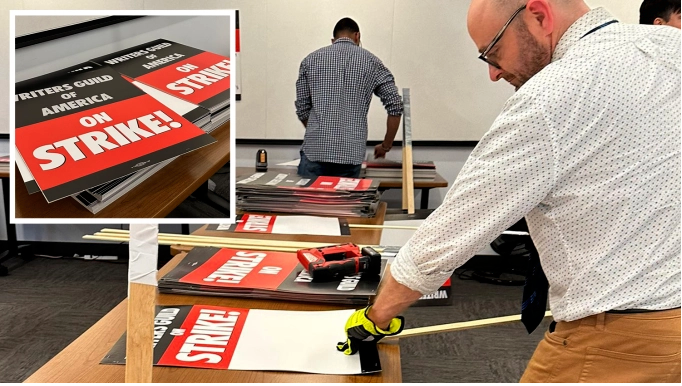Hollywood Writers Strike After Negotiations Stall
After negotiations between the Writers Guild of America (WGA) and several studios failed to reach a deal over pay, staffing, and concerns about artificial intelligence (AI), over 11K film & TV writers went on strike Tuesday, forcing production to halt for film and scripted TV.

Facts
- After negotiations between the Writers Guild of America (WGA) and several studios failed to reach a deal over pay, staffing, and concerns about artificial intelligence (AI), over 11K film & TV writers went on strike Tuesday, forcing production to halt for film and scripted TV.1
- The WGA, which said screenwriting was facing an "existential crisis," has demanded a greater share of residuals from streaming, a ban on the use of AI in writing material, a staffing minimum of 6-12 writers per show, and a guaranteed minimum number of weeks of employment.2
- The Alliance of Motion Picture and Television Producers (AMPTP), a trade association negotiating on behalf of Hollywood companies, stated that the main "sticking points" were the staffing minimum and guaranteed working weeks but that they're "prepared to improve" their offer in continued negotiations.3
- The streaming era has seen a shortening of season length for TV programs and, according to the WGA, a 46% reduction in showrunner pay compared to broadcast shows. Companies are also feeling pressure from investors to cut losses in digital media, with the Walt Disney Co. set to lay off 7K.4
- Late-night TV is set to be the first to halt production, while network TV and streaming will be mostly unaffected for the time being. The AMPTP claims over 20K crew members could lose work, with up to 600 productions being halted.5
- The last WGA strike lasted for 100 days between 2007 and 2008 and is estimated to have had an economic cost of $3B, adjusted for inflation.5
Sources: 1Reuters, 2BBC News, 3CBS, 4CBC, and 5CNN.
Narratives
- Narrative A, as provided by New York Times. There's no Hollywood without the writers. All they are asking for is fair compensation to keep up with the changing trends in media consumption and to preserve their livelihoods. The streaming age has seen an explosion in the quality and quantity of content thanks to the writers who have been continually demeaned and undervalued. The studios need to offer the writers a deal that accurately reflects this.
- Narrative B, as provided by CNBC. These writers may have picked a fight they cannot win. The streaming boom is over, and the once cash-flush platforms are feeling the pinch. Platforms are in no rush to spend money or greenlight another prestige show as investors bear down on them to turn a profit. Everyone in the industry is grappling with this slowdown, and writers shouldn't receive special treatment.






